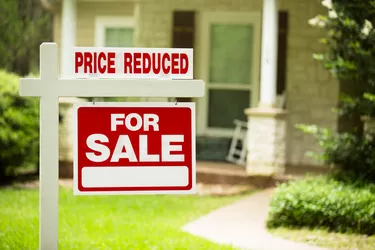
The economy has been on a roller coaster ride in the 2020s, at least partially influenced by the coronavirus pandemic. Mortgage rates were at 2.9 percent last year as of July 2021. They climbed to 5.1 percent by April 2022, according to the Urban Institute, then to 5.7 percent by the end of June 2022.
Then they began declining. Rates were at 5.3 percent in the first week of July 2022, according to Freddie Mac. They dropped to 4.99 percent by the first week of August. But what does this mean for prospective homebuyers who are interested in a 30-year mortgage?
Video of the Day
Video of the Day
Effects of Inflation
The driving factor behind these mortgage interest rate changes is the economy and the federal government's efforts to contain inflation. The Federal Reserve tends to increase its basic, benchmark borrowing rate, the federal funds rate, to curb price increases, the theory being that consumers will buy less if they have to pay more in interest to borrow money for purchases. Prices then drop when consumers aren't buying.
Your decision could come down to how low you think mortgage interest rates might go during this mid-2022 trend.
Consumer prices overall were up 9.1 percent in early August 2022 from what they were a year before. The Fed raised its benchmark borrowing rate in response. Florida Realtors indicates that the Federal Reserve's June 2022 increase was the greatest since 1994. It was its second in two months. Inflation was at a 40-year high at the same time.
This would seem to imply that federal interest rate hikes make mortgage rates decline, but the equation is more complicated than that. Marketplace.org explains that mortgage rates tend to run hand-in-hand with the current yield on 10-year treasury bonds. The yield has been down in 2022 as investors consider the risk of a recession that could be prompted by increasing Federal Reserve interest rates. This prompts more investors to turn to the relative safety of bonds, and this reduces yield.
Effect on the Housing Market
The increased federal benchmark rate is intended to reduce inflation's effect on real estate and home prices, but high interest rates deter potential homebuyers.
U.S. home purchases dropped consistently through the first six months of 2022, even as home prices ratcheted higher due to the effects of inflation. Florida Realtors reports that the national median home price increased by 13.4 percent from June 2021 through June 2022. Mortgage applications dropped by 17 percent during this time period as a result.
Lenders have been forced to respond. Online mortgage companies are in the process of cutting jobs. JPMorgan Chase is said to have laid off hundreds of employees. Mortgage.org indicates that lenders are dropping their mortgage rates in an effort to enhance affordability and entice prospective homeowners into buying, even as home prices climb
Effect on Borrowers
How this affects you and your homebuying efforts depends on the type of mortgage you take out.
As the name implies, your interest rate won't budge over the term of your home loan if you take out a fixed-rate mortgage. Your rate will still be 4.99 percent in 2052 if you take out a 30-year fixed-rate mortgage at that rate in 2022. That's a good deal if your crystal ball tells you that rates will be 10 percent higher in twenty years. It's not such a great deal if lenders continue to drop rates in a bid to bring borrowers back. You're locked in at 4.99 percent if mortgage rates drop by another 0.5 by next year. Of course, you could refinance if the break even on that works in your favor.
Your mortgage rate will fluctuate with an adjustable-rate loan, keeping pace with changes in the economy. According to the Federal Deposit Insurance Corporation, you might enjoy a low rate for as long as the first 10 years of your home loan, because these mortgages typically start out with lower rates than fixed-rate loans. But your rate can skyrocket after this period if rates increase significantly during this time. Refinancing wouldn't be a fix-it option because a new loan would be subject to these higher rates at that time, too.
Your decision could come down to how low you think mortgage interest rates might go during this mid-2022 trend. Can you wait to buy and lock into a fixed-rate mortgage a little later when you think rates have hit rock bottom? Or you might want to take an adjustable-rate mortgage now and enjoy those rate dips when and if they come, even if your current mortgage rate jumps significantly in 10 years' time.
- Florida Realtors: Mortgage Rates Drop Again This Week to 5.3%
- Florida Realtors: Mortgage Rates Drop Below 5%
- Urban Institute: How Higher Mortgage Rates Have Historically Affected Home Prices
- Marketplace.org: Why Mortgage Rates Have Been Falling Recently
- Federal Deposit Insurance Corporation: Mortgages